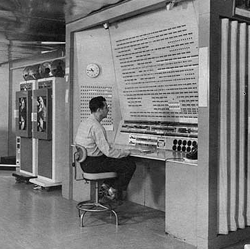The final words of condemned prisoners in Ohio could be edited or shortened under new state prison rules announced Thursday, six months after an inmate recited prayers for 17 minutes before he was executed. The man apologized for his crime, then recited the rosary and other prayers before he died, choking back tears as he repeatedly said the Hail Mary with rosary beads in one hand. At 17 minutes, it was the longest final statement by a condemned Ohio inmate since executions resumed 11 years ago.
Monthly Archives: November 2010
End of the desk-top era
 I’ve had a computer on my desk at home since 1984. A lot of them. Zenith, Gateway, IBM, Dell and, most recently, a Mac Mini. No longer. I’m selling the Mini.
I’ve had a computer on my desk at home since 1984. A lot of them. Zenith, Gateway, IBM, Dell and, most recently, a Mac Mini. No longer. I’m selling the Mini.
Oh, there are still lots of computers around the house. The MacBook Pro long ago became my main box (slab?). And there’s the iPad and the iPhone. But it felt like the end of an era.
This weekend I’ll replace my printer and scanner with a wireless all-in-one from HP and as I started making room, I was struck by how many usb hubs and power-strips were being relegated to a box in the closet.
Yesterday I had a chat with one of our IT guys about where things are headed from a business perspective. Are we getting closer to the day when a company tells a new employee they can use their own computer (any flavor they choose) and hook into the company content via the cloud.
I took a little further and suggested the device of chose would be some sort of tablet, not a laptop. Whatever shakes out, things are going to be much different for the users and the IT folks who support them.
Twitter and the Power of Giving People a Voice
“Many people are still focused on Twitter as a tool for promoting movies or TV shows, or see it as a toy that geeks and their friends play with to amuse themselves. The real power in what Jack Dorsey and Biz Stone created (and what Ev Williams later financed and built into a company) could well be that it is the simplest, the easiest and arguably one of the most efficient forms of mass publishing — or at least micro-publishing — ever invented.”
My favorite line from this post: “… a tweet can be passed around the world and back before newspaper reporters are even getting their shoes on.”
r.
The Future of Advertising
Once upon a time I thought I might like to work at an advertising agency. I had no idea what an advertising agency did but ti seemed like a glamorous job and I was writing and producing commercial for the radio station I was working at, so… why not.
In the years since, advertising has been what put the pay in my paycheck.
Enter the Web (the dragon has come and gone). Like just about every other institution, advertising is being disrupted. In this article at Fast Company, Danielle Sacks talks to some of the players. If you care who said what, you can read the full article. For that matter, if you’re involved in ad-supported media in any way, you should read the article.
“Something digital immigrants would do is make a phone call to make sure someone received an email.”
Our company is like Ellis Island. I receive email from some co-workers and know that I can turn around in my chair and they will be standing there, “just making sure” I received their electronic message.
“Like a beetle preserved in amber, the practice of advertising has sat virtually unchanged for the last half-century.”
“The ad business became an assembly line as predictable as Henry Ford’s. The client (whose goal was to get the word out about a product) paid an agency’s account executive (whose job was to lure the client and then keep him happy), who briefed the brand planner (whose research uncovered the big consumer insight), who briefed the media planner (who decided which channel — radio, print, outdoor, direct mail, or TV — to advertise in). Then the copywriter/art director team would pass on its work (a big idea typically represented by storyboards for a 30-second TV commercial) to the producer (who worked with a director and editors to film and edit the commercial). Thanks to the media buyer (whose job was to wine-and-dine media companies to lower the price of TV spots, print pages, or radio slots), the ad would get funneled, like relatively fresh sausage, into some combination of those five mass media, which were anything but equal. TV ruled the world. After all, it not only reached a mass audience but was also the most expensive medium — and the more the client spent, the more money the ad agency made.”
“The death of mass marketing means the end of lazy marketing.”
“The Internet has turned what used to be a controlled, one-way message into a real-time dialogue with millions.”
“…the most surprising aspect of JetBlue’s agency search was how many firms still believed that the key to solving any business problem was the 30-second spot.”
“We have to figure out how to get paid for the big idea, and what that idea is worth.” — “People who think that way are supremely well equipped to work in a world that no longer exists.”
“I thought digital was just another medium”
“Collapse is simply the last remaining method of simplification. When the ecosystem stops rewarding complexity,” he writes, “it is the people who figure out how to work simply in the present, rather than the people who mastered the complexities of the past, who get to say what happens in the future.” – Clay Shirky
I have no idea how –or when– this will shake out. Or how much fan poop will come my way. But it’s an exciting time of great change. I describe these as Lawn Chair Moments. There’s going to be a big train wreck and you want to get a good view. But you don’t want to put your lawn chair too close.
More after this brief commercial message.
Scott Adams: Facebook Killer
“Facebook is primarily a record of your past. Imagine a competing service that I will name Futureme for convenience. It’s an online system in which you post only your plans, both immediate and future. As with FaceBook, you decide who can see your plans. You might, for example, allow only specific family members to see your medical plans, but all of your friends can see your vacation plans, or your plans to buy a new couch.
The interface for Futureme is essentially a calendar, much like Outlook. But it would include extra layers for hopes and goals that don’t have specific dates attached.
For every entry to your Futureme calendar, you specify who can see it, including advertisers. If you allow advertisers a glimpse of a specific plan, it would be strictly anonymous. Advertisers could then feed you ads specific to your plan, while not knowing who they sent it to. The Futureme service would be the intermediary.
Now imagine that you never have to see any of the incoming ads except by choice. If you plan to buy a truck in a month, you would need to click on that entry to see which local truck advertisements have been matched to your plans. This model turns advertising from a nuisance into a tool. You‘d never see an ad on Furureme that wasn’t relevant to your specific plans.”
TimeScapes: Rapture
Another beauty by way of Todd Perry.
Pandora on a dime a day
Here are the last 10 songs I listened to on Pandora:
Treat Me Right – Grace Potter
I Rather Be Blind, Crippled and Crazy – Derek Trucks
Voodoo Chile – Eric Clapton and Steve Windwooed
Maps – Yeah Yeah Yeah
Whatever You Like – Anya Marina
Beat It – Pomplamoose
What I Wouldn’t Do – A Fine Frenzy
Hotel Song – Regina Spektor
Smile – Lily Allen
Momma’s Boy – Elizabeth and the Catapult
Before Pandora, I had never heard of any of these artists (except Winwood and Clapton). What I’d like to know from those of you who regularly listen to terrestrial radio stations, would I hear these songs there? How about this particular mix?
I pay $36 a year for Pandora One, which gives me unlimited listening with no commercials. What is that, a dime a day?
The “human cloud” and the future of work
I’ve been working almost 40 years (more if you count high school and college jobs) and a lot has changed in how I work; where I work; and –obviously– the work itself. Smarter folk than I are thinking about this, too:
“In the same way that high-speed Internet access disrupted the corporate IT market, creating a “cloud” of web-enabled infrastructure, the human cloud is shorthand for how the web has disrupted the way we work. Companies rely on dispersed teams to get the best talent available regardless of location (or price) and many are using crowdsourcing and other innovative means to achieve their goals.
Meanwhile, many people who work in this new cloud have lives that look nothing like they would have even10 years ago: they may have contracts with a variety of clients, outsource themselves and their skills through a third-party service like Elance or ODesk or collaborate with coworkers in opposing time zones. The companies they work for, and with, may not even know what they look like, or where they live. This is the reality of the human cloud and it is changing us (and the companies we work for) in ways we may not fully realize yet.”
Given the “webby” nature of my work, I have a good bit of contact with the “human cloud” and find myself wondering how I would function there.
Oak Tree

Oak Tree Surprise, originally uploaded by mshhoward.
Matt Howard found this spot in the Buffalo River area. Looks like a painting. How nice that there are spots like this and people like Matt to find and share them.

